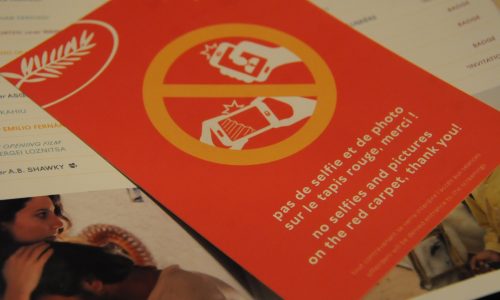
Long before the Cannes Film Festival starts each year, there’s always some buzz about something. Usually it’ll be the opening night film, or possibly a controversy about the number of female directors or the number of Palme d’Or nominees who’ve been in competition before. Last year it was the tightened security but this year, one of the main points of discussion before anyone arrived on the Croisette was the already infamous selfie ban. Some might regard this as somewhat snobbish, but the festival’s director Thierry Frémaux simply finds them to be ugly, even grotesque. There is a practical reason – that it slows down the process of filling the cinemas and can result in a pile-up if someone stops suddenly to take a photo – although this is rarely mentioned. But just in case the whole subject has passed you by, so important is it to the organisers that in the age of the smart phone, no-one should take advantage of one of their most common uses, that every delegate receives a post-card reminder when they collect their badge.
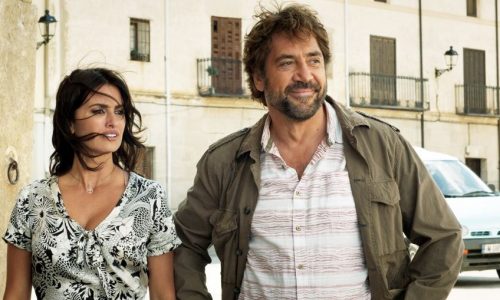
Generally, I’m not a selfie person, but it is true that the Cannes red carpet is somewhere that even people like myself might get a twitchy selfie finger, so mounting the stairs to see the opening film, Asghar Farhadi’s Spanish language thriller Everybody Knows, the heavy security presence went some way to reminding me to keep my phone well away from the carpet. For this particular screening, the press were confined to the front few rows, which wouldn’t ordinarily be a problem, but when the film is in neither English nor French, the French subtitles sit on the film itself, while the English subtitles appear in a separate bar below the screen – a separate bar, much of which was obscured from my view by the heads of the people in the front row, the stage beneath the screen, my short stature and the natural tendency to slouch in comfy cinema seats, when you’ve been up since 4am to travel 650 miles to see a film. Apart from having to rely more than I’d have liked on my faint recollection of schoolboy Spanish, from a cinema-going point of view, the biggest problem with this – particularly if you’re sitting close to the front – is that if you’re looking below the screen to read the subtitles, you have little sense of the performances and often aren’t even sure which character is even speaking. That said, there was no mistaking a strong and complex performance from the always reliable Javier Bardem as a village vineyard owner who bears the brunt of the consequences when a young family member disappears during a family wedding. As the who-dunnit plot intricately unfolds, Farhadi deftly tears the family apart as secrets about almost every character’s past start to emerge – although in many cases, they’re not quite as secret as you might expect, as the title might suggest. It’s a cleverly structured thriller but the denouement is a bit of an anticlimax, given some of the far more interesting red herrings thrown our way, and Farhadi offers us none of the additional layer of social commentary he usually adds to his films, perhaps because he doesn’t understand Spanish culture as well as he understands his own.
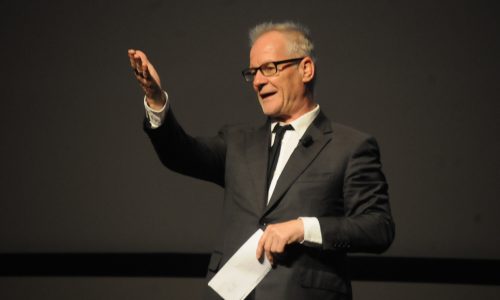
One thing about starting my Cannes earlier than normal is that as well as getting to see the opening film of the Official Selection, I also got to see not just the opening film of the more art-house sidebar Un Certain Regard programme, but I also got to see it’s opening ceremony, at which the aforementioned Thierry Frémaux introduced the jury, led by Benicio del Toro. During his preamble, Frémaux presented a montage of the eighteen films in that competition and – and as a frustrating failure of my schoolboy French, I couldn’t quite work out whether this was a fact or a joke – mentioned that he’d received a reply from Vladmir Putin himself to his request for the Russian director Kirill Serebrennikov to be allowed to travel to Cannes for the screening of his film Summer, despite a fraud case against him; Mr Putin – we were told – replied something along the lines of “I’d love to help, but unfortunately, the Russian judicial system is independent.” Del Toro then addressed the audience on behalf of his jury, thanking – among others – Air France for flying him to Nice and the Hotel Majestic for putting him up.
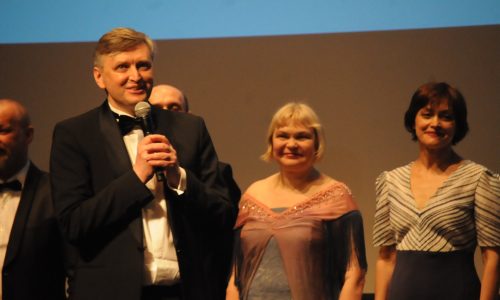
The opening film of the Un Certain Regard strand was Ukrainian Sergei Loznitsa’s Donbass – an offbeat examination of the tensions in the restive eponymous area in the east of his country. He introduced his film by announcing that he had finished the shoot only six weeks before today’s world premiere – which sounded remarkable until you actually see the film and note how many lengthy uncut takes there area. It’s a peculiar film in that there’s no effort to present any coherent narrative – it’s very much a series of vignettes, generally linked, Monty Python style, with a minor character walking away from one scene and into the next, where they’re at the heart of proceedings. This cinematic stream of consciousness is an odd blend of comically surreal, cutting satire and chilling, with scenes ranging from a raucous wedding to the expropriation of a civilian’s car and the humiliation of a prisoner of war – the latter features a scene with a group of young people taking selfies; I presume Thierry Frémaux missed that grotesque scene, otherwise the film probably wouldn’t have been selected. Almost without exception, the free-standing sketches feature members of the rebel military, variously exercising their authority over civilians or being praised by supporters for protecting them from the government in Kiev that many of them regard as being fascist. Chatting outside afterwards to the Guardian’s Peter Bradshaw, one of my favourite (fellow, if I can be so bold as to use the word) reviewers, to get a sneak preview of what he might say – “there are good things about it and not so good things about it” – which, on the surface, doesn’t sound particularly helpful, but in fact sums it up quite well.
Next I had time to pop back to the apartment – a brisk 15 minute walk from the Palais – to freshen up for the evening, which was to begin with what was described as cocktails with a New York based company called Singular DTV. By the time I arrived, it must have all but finished, because there were few obvious signs of anything going on – least of all any cocktails. I ended up helping myself to a glass of rose from an open bottle and looked around for a pamphlet to find out more about the company that had paid for it. As luck would have it, I found a pamphlet in a goodie bag, containing Singular DTV branded baseball cap. It turns out that the company is “the world’s first blockchain entertainment studio, powered by the Ethereum platform.” So now you know.
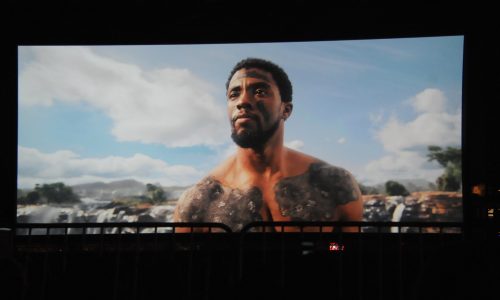
The final film of the day was a late addition to the schedule – over the years, I’ve often seen snippets of films playing at the Cinema on the Beach, but never before has there been an almost current film that I’ve missed showing at a time that I can make, so fortuitously, I finally got to watch Black Panther. On the beach. I’ve seen outdoor cinemas before, but from the point of view of video projection and sound, it was almost as good as being inside a cinema. Even more of a bonus was to have the screening introduced by not only Thierry Frémaux – yes, him again – but also by the director Ryan Coogler, who’s in town for a workshop tomorrow. He noted that his first time in Cannes was with a short in the Short Film Corner area of the market in 2009 and now he has one of the biggest box office successes in comic-book adaptation history under his belt. My first time as a director in Short Film Corner was two years earlier and I still haven’t done a comic-book adaptation feature.
